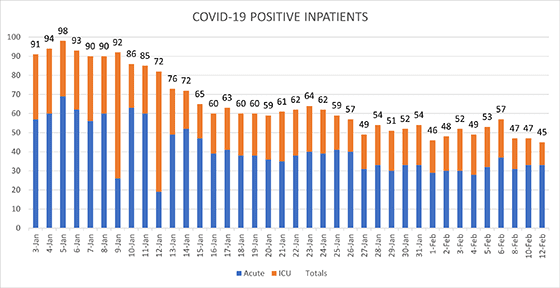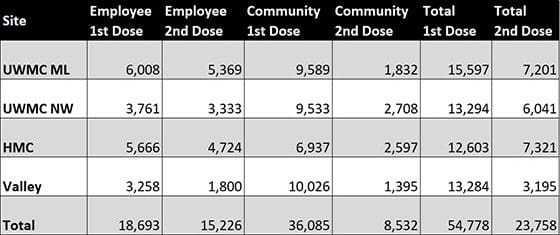Sometimes moving slowly is the best way to make progress. This comes to mind now as we continue to see gradual improvement in the downward trend of COVID-19 cases and patients statewide. This week alone, there are nearly half the number of COVID-19 patients in our UW Medicine hospitals than there were in December. This steady decrease is a promising sign that we are making the right decisions on masking and distancing. Maintaining this decrease means staying the course and not letting up. We also know that widespread access to vaccination remains the end goal. Between now and then, challenges will continue to arise, but I remain confident that we can handle them.
As the overall cases of COVID-19 slow down, we are seeing a rise in the B1.1.7 variant (initially described in the U.K.) in the U.S. Based on current models, this variant of concern will likely be the predominant strain here in the U.S. by the end of March. The good news is that, although this variant will increase, we know that all of the tools we already use (masking, distancing, etc.) are highly effective, and at the same time, more of the population is getting vaccinated. We also know the vaccines in current distribution to be effective in working against this variant. Although we still face challenges with vaccine supplies, UW Medicine is working as quickly, safely and equitably as possible to vaccinate our community. The process may seem slow, but we are making progress.
For up-to-date vaccine information, please remember to consult Frequently Asked Questions About COVID-19 Vaccines for Employees on The Huddle.
Today’s update includes:
• Local/National/Global Epidemiology
• Vaccination Summary
• Upcoming Webinar March 1: COVID-19 Vaccine & Allergy
• COVID-19 Employee Testing Survey Downtime
UW Medicine COVID-19 Activity Summary

Local/National/Global Epidemiology
King County: Public Health – Seattle & King County is reporting 79,233 total cases and 1,305 deaths as of Thursday, Feb. 11. The number of new positive tests is currently at 156/14 days/100,000 people. The effective reproductive (Re) number was estimated to be 0.6 (estimate range: 0.2 – 1.0).
Washington: The Department of Health reports 309,673 cases and 4,633 deaths as of Wednesday, Feb. 10. Of the 4,840,076 people who have been tested, 6.4% have been positive.
United States: The Centers for Disease Control and Prevention reports 97,309 new cases, 27,127,858 total COVID-19 cases and 470,110 deaths as of Feb. 11.
Global: The WHO COVID-19 Dashboard reports 107,423,526 confirmed COVID-19 cases and 2,360,280 deaths as of Feb. 12.
UW Medicine Vaccination Summary as of Feb. 11

*Total Doses Given: 78,536. Site numbers represent doses administered, not the number of people who have been vaccinated and work at each site.
Upcoming Webinar March 1: COVID-19 Vaccine & Allergy
UW Medicine is hosting a COVID-19 Vaccine & Allergy webinar for providers, presented by David Coleman, MD, and Shireesha Dhanireddy, MD, at noon Monday, March 1. The session will cover incidence of anaphylaxis, vaccine side effects and cases of common reactions. Look for an email next week with a link to register. If you do not receive the invitation or are unable to attend, the webinar will be recorded and available online.
COVID-19 Employee Testing Survey Downtime
The UW Medicine Employee COVID-19 Testing Survey will be unavailable next week from 7 p.m. Friday, Feb. 19, until 1 a.m. Saturday, Feb. 20, for a critical upgrade. During this brief period, you will not be able to take the survey, which is required prior to scheduling an appointment for COVID-19 PCR testing. You can also find this link, along with all of the COVID-19 policies and protocols at one.uwmedicine.org/coronavirus.
On the topic of moving slowly to make progress, I am personally planning to slow things down a bit next week. I’m taking a mid-winter break to spend time with my family and will be on hiatus from my weekly update until the last week of February. Hopefully, some of you are also able to fit in some personal time away from work during these cold winter days. Being there for each other helps make that happen. This community support is also what’s given us the perseverance to keep going over the past year — and it’s what will continue to keep us strong in the fight to end the pandemic. We’re in this together.
Thank you for all that you do. Stay safe and stay warm!
Sincerely,
John Lynch, MD, MPH
Medical Director, Infection Prevention & Control
Associate Medical Director, Harborview Medical Center
Division of Allergy & Infectious Diseases, UW School of Medicine

